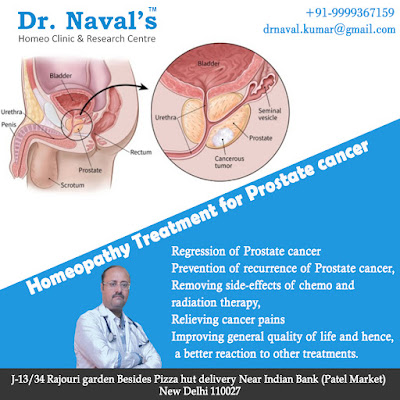TREATMENT OF PROSTATE CANCER
Treatment of prostate cancer has got to be multi-way medical care. it isn't either homeopathy or standard treatment. the most effective long-run results are achieved by a combination of
therapy counting on age, stage of glandular cancer and general health condition of the patient. while standard treatments like chemotherapy or radiotherapy facilitate in quicker removal of cancer, homeopathy Treatment for willcer|prostatic adenocarcinoma|adenocarcinoma|glandular cancer|glandular carcinoma} can facilitate in
Homeopathy Treatment for prostate cancer can help in
- Regression of prostate cancer
- Prevention of repeat of prostate cancer,
- Removing side-effects of chemo and radiotherapy,
- Relieving cancer pains
- Improving general quality of life and therefore, an improved reaction to different treatments.
Introduction of Prostate Cancer:-
- Prostate cancer is cancer that begins in tissues of the prostate gland.
- The prostate is the male sex gland and it is responsible for the production of semen.
- The prostate gland is located just below the bladder and in front of the rectum.
- Most Prostate Cancers are slow growing in nature and the primary risk factors are obesity, age and family history.
- The cancer cells may metastasize (spread) from the prostate to other parts of the body, particularly the bones and lymph nodes.
Prostate cancer is very uncommon in men younger than 45 years of age but becomes more common with advancing age. It generally affects men over 50 years of age group.
The average age at the time of diagnosis is 70 years.
Estimated new cases and deaths from prostate cancer in the United States in 2013:
New cases: 238,590
Deaths: 29,720
Types of Prostate Cancer: – The types of Prostate Cancer are as follows:-
Adenocarcinoma: – The most common type of prostate cancer is Adenocarcinoma. This cancer is generally slow growing in nature but still has the potential to spread beyond the prostate to other areas, including lymph nodes, bones, and other organs.
Small cell carcinoma: – This is a rare type of prostate cancer. This is aggressive in nature. Initially, it forms in specialized cells within the prostate. This type of cancer generally doesn’t increase prostate-specific antigen (PSA) levels and is difficult to detect in its early stages. More advanced cases of small cell carcinoma can be difficult to treat.
